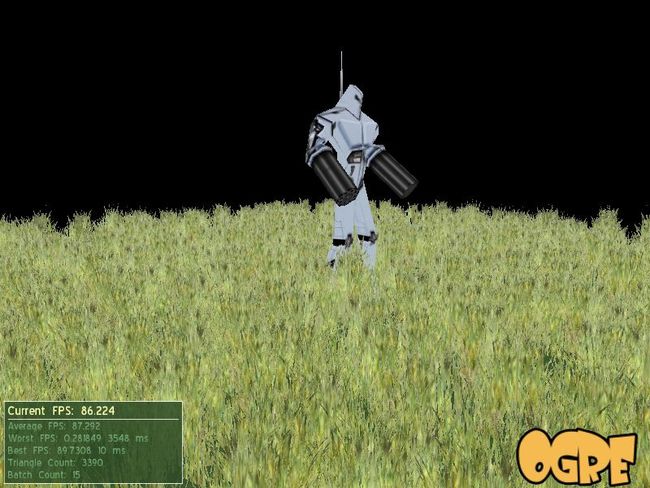Ogre静态管线和手绘Mesh ManualObject
先说ManualObject
MannualObject mo;
mo.begin("Examples/GrassBlades",RenderOperation::OT_TRIANGLE_LIST);
for (int i=0;i<3;++i)
{
mo.position(-vec.x,height,-vec.z);
mo.textureCoord(0,0);
mo.position(vec.x,height,vec.z);
mo.textureCoord(1,0);
mo.position(-vec.x,0,-vec.z);
mo.textureCoord(0,1);
mo.position(vec.x,0,vec.z);
mo.textureCoord(1,1);
int offset = i*4;
mo.triangle(offset,offset+3,offset+1);
mo.triangle(offset,offset+2,offset+3);
vec = rot * vec;
}
mo.end();
mo.convertToMesh("GrassBladesMesh");
所谓ManualObject就是使用自定义顶点,索引,纹理坐标,和DX 里定义顶点差不多。最后convertToMesh,将这个模型保存在ResourceManager里面。
再说静态管线,对于静态管线,就是诸如游戏中的建筑物,树啊,草啊,这些不用移动的物体,用静态渲染,我想这个和DX里面将顶点存入静态Memorypool。
静态管线首先设置一个区域,区域由中心点和范围组成,一个矩形区域,然后在这个矩形区域添加物体即可。
下面是在静态管线中创建草坪的代码。
Entity* grass = mSceneMgr->createEntity("grass","GrassBladesMesh");
StaticGeometry* sg = mSceneMgr->createStaticGeometry("GrassArea");
const int size = 375;
const int amount = 20;
sg->setRegionDimensions(Vector3(size,size,size));
sg->setOrigin(Vector3(-size/2,0,-size/2));
for (int x=-size/2;x<size/2;x+=size/amount)
{
for (int z= -size/2;z<size/2;z+=size/amount)
{
Real r = size/(float)amount/2;
Vector3 pos(x+Math::RangeRandom(-r,r),0,z+Math::RangeRandom(-r,r));
Vector3 scale(1,Math::RangeRandom(0.9,1.1),1);
Quaternion oritention;
oritention.FromAngleAxis(Degree(Math::RangeRandom(0,359)),Vector3::UNIT_Y);
sg->addEntity(grass,pos,oritention,scale);
sg->build();
}
}
}
再说说草的绘制,一个四边形立起来,上面是一张草的图片,然后旋转60,绕垂直轴,再旋转60,4*3 =12个顶点。
